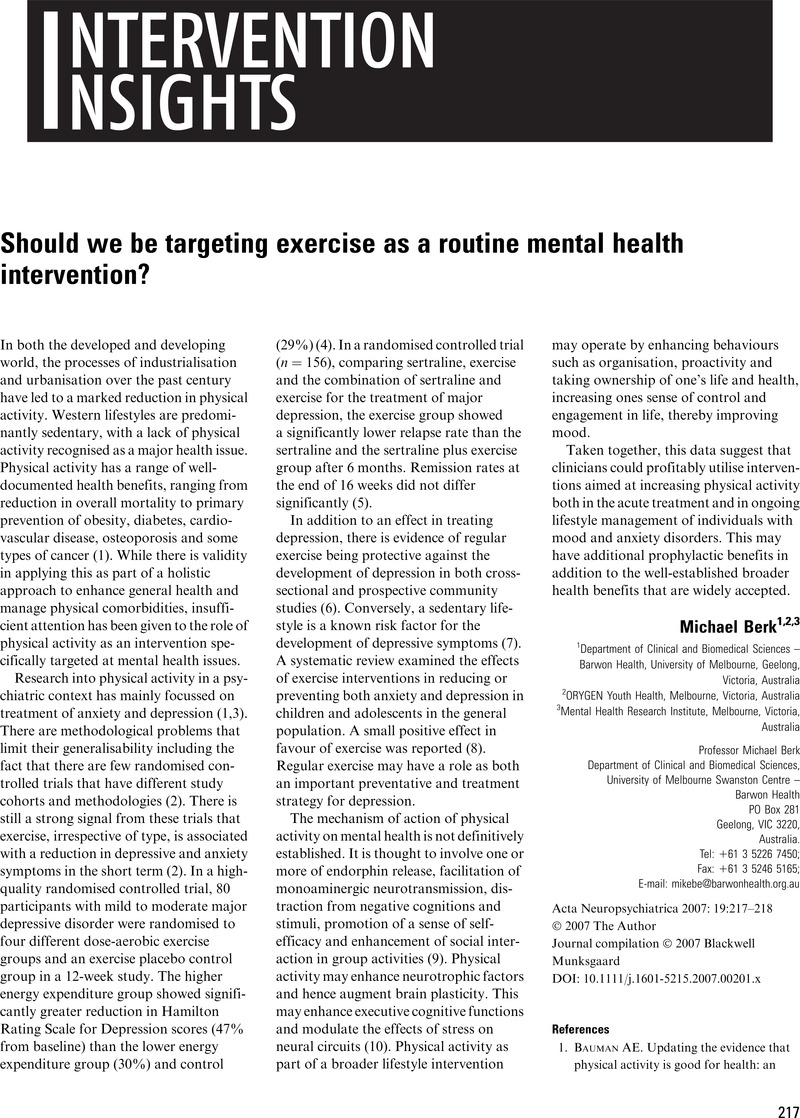Crossref Citations
This article has been cited by the following publications. This list is generated based on data provided by Crossref.
Malhi, Gin S.
2007.
Consciousness: a gray matter?.
Acta Neuropsychiatrica,
Vol. 19,
Issue. 3,
p.
135.
Malhi, Gin S.
2008.
An emphasis on stress.
Acta Neuropsychiatrica,
Vol. 20,
Issue. 3,
p.
111.
Soh, Nerissa L
Walter, Garry
Baur, Louise
and
Collins, Clare
2009.
Nutrition, mood and behaviour: a review.
Acta Neuropsychiatrica,
Vol. 21,
Issue. 5,
p.
214.
LePage, Marie L.
and
Crowther, Janis H.
2010.
The effects of exercise on body satisfaction and affect.
Body Image,
Vol. 7,
Issue. 2,
p.
124.
Malhi, Gin
Adams, Danielle
Plain, Janice
Coulston, Carissa
Herman, Michael
and
Walter, Garry
2010.
Clozapine and Cardiometabolic Health in Chronic Schizophrenia: Correlations and Consequences in a Clinical Context.
Australasian Psychiatry,
Vol. 18,
Issue. 1,
p.
32.
Pasco, Julie A.
Williams, Lana J.
Jacka, Felice N.
Henry, Margaret J.
Coulson, Carolyn E.
Brennan, Sharon L.
Leslie, Eva
Nicholson, Geoffrey C.
Kotowicz, Mark A.
and
Berk, Michael
2011.
Habitual physical activity and the risk for depressive and anxiety disorders among older men and women.
International Psychogeriatrics,
Vol. 23,
Issue. 2,
p.
292.
Darongkamas, Jurai
Scott, Helen
and
Taylor, Emily
2011.
Kick-starting Men's Mental Health: An Evaluation of the Effect of Playing Football on Mental Health Service Users' Well-Being.
International Journal of Mental Health Promotion,
Vol. 13,
Issue. 3,
p.
14.
Motta, Robert W.
McWilliams, Meredith E.
Schwartz, Jennifer T.
and
Cavera, Robert S.
2012.
The Role of Exercise in Reducing Childhood and Adolescent PTSD, Anxiety, and Depression.
Journal of Applied School Psychology,
Vol. 28,
Issue. 3,
p.
224.
Melo, Lígia Gizely dos Santos Chaves
Oliveira, Kleber Roberto da Silva Gonçalves de
and
Vasconcelos-Raposo, José
2014.
A educação física no âmbito do tratamento em saúde mental: um esforço coletivo e integrado.
Revista Latinoamericana de Psicopatologia Fundamental,
Vol. 17,
Issue. 3,
p.
501.
Ekkekakis, Panteleimon
and
Murri, Martino Belvederi
2017.
REMOVED: Exercise as antidepressant treatment: Time for the transition from trials to clinic?.
General Hospital Psychiatry,
Vol. 49,
Issue. ,
p.
1.
Ekkekakis, Panteleimon
and
Murri, Martino Belvederi
2017.
Exercise as antidepressant treatment: Time for the transition from trials to clinic?.
General Hospital Psychiatry,
Vol. 49,
Issue. ,
p.
A1.



